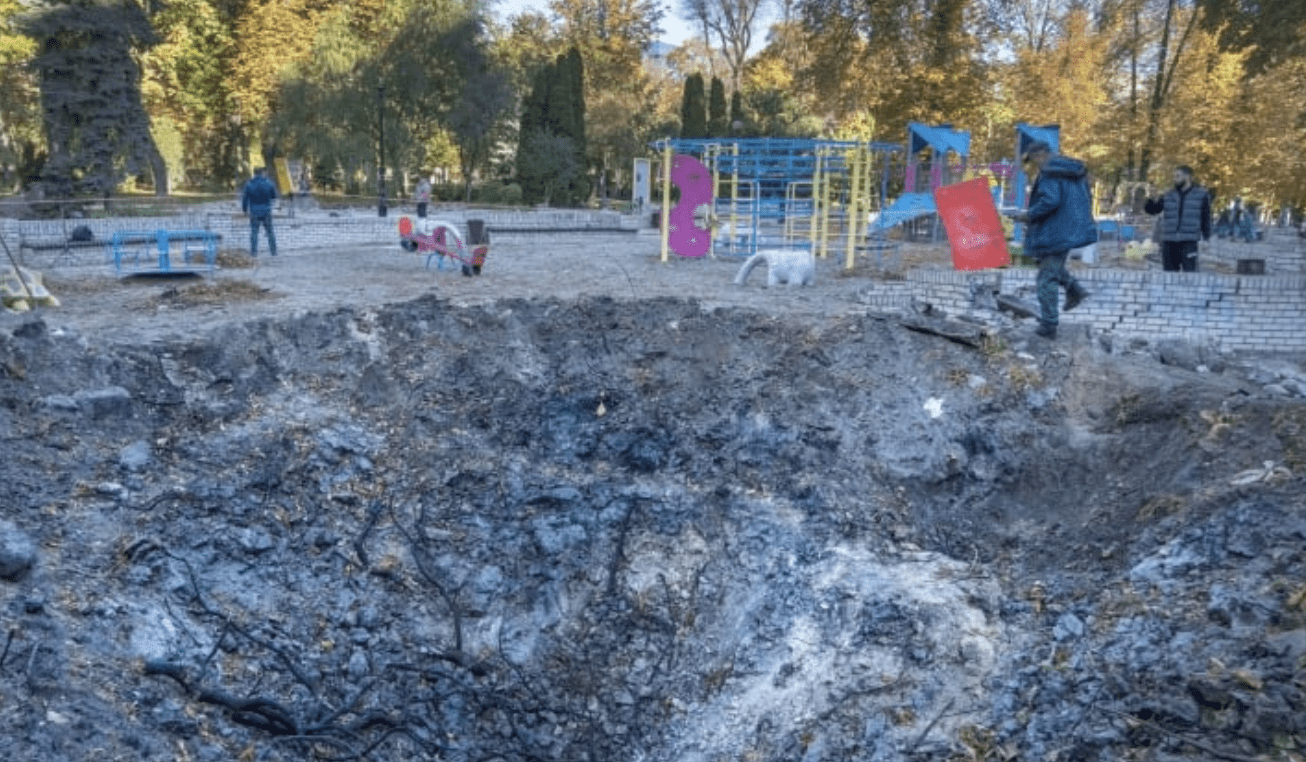Vladimir Putin’s October Syurpriz
 A missile crater in a Kyiv playground on Monday, October 10/AP
A missile crater in a Kyiv playground on Monday, October 10/AP
Lisa Van Dusen
October 11, 2022
The term October Surprise was coined in the pre-election fall of 1980 by Ronald Reagan campaign director and Wild Bill Donovan–OSS-era protegé William Casey. To pre-emptively frame any pre-election breakthrough in the Iran hostage crisis still filling nightly newscasts at the time as purely tactical, Casey told the media that Reagan feared the incumbent Democratic president, Jimmy Carter, would conspire with Iran to stage an “October Surprise” hostage release designed to tilt the election.
It seems only fitting — looking back from our ongoing orgy of narrative warfare misrepresentation, misdirection, industrialized BS and other intelligence practices that have migrated since the operational force multiplier of the internet to mainstream politics — to remind ourselves that the October Surprise that birthed the term wasn’t an October Surprise at all, but a January surprise. In a famous convergence of optics and psy-ops dazzle, the hostages were freed minutes after Reagan’s inauguration on January 20, 1981. A week later, Casey was sworn in as CIA director.
Two congressional investigations into the October Surprise conspiracy theory — back in the days before conspiracy theorist became a drama-school dropout career choice — found no credible evidence of a deal to delay the release of the hostages.
Since then, “October Surprise” has come to mean any stunt orchestrated to alter a US election homestretch to produce and/or rationalize an otherwise impossible or implausible outcome. In recent years, narrative disruption stunts have multiplied so far beyond October to the entire Gregorian calendar that stunts orchestrated to disrupt have become the narrative itself, as with the entire presidency of Donald Trump, among other narrative-hijacking superstunts.
As has been obvious since Vladimir Putin first began mobilizing Russian troops on Ukraine’s border, back in the days when Russian troops were moving toward the Ukraine border rather than running away from it, the timing of his illegal, non-negotiable invasion of Ukraine months before the US midterm elections was as much about the US as it was about Ukraine. Per Russian Foreign Minister Sergey Lavrov in April, the invasion was “meant to put an end” to US “global domination”.
Putin’s missile strikes against civilian targets in major Ukrainian cities, including Kyiv, which began Monday, could have been conducted at any point in the past eight months, bridge or no bridge, birthday or no birthday.
When Putin invaded Ukraine on February 24th, he unleashed an aspiring-new-world-order assault on Ukrainian democracy, European security and Joe Biden’s presidency by catalyzing and rationalizing a number of rolling, daily headline-generating, every-day-is-October narratives. Those include: kinky supply chains (with an assist from COVID disruption and China’s ownership stake in more than 100 ports worldwide); non-transitory inflation (with an assist from a Putin-instigated and rationalized energy crisis); and food-price spikes (with an assist from Putin’s energy and supply chain crisis-amplification, see above). As year-round October surprises go, Putin’s invasion of Ukraine has been a superspreader event.
After Saudi Arabia — whose status as a member of the anti-democracy, aspiring new world order was secured when it beheaded a journalist during an otherwise routine consular appointment in 2018 — launched old-school October Surprise month on the 5th with an OPEC production cut designed to raise pre-midterm oil prices, it would have been unthinkable, to the extent that anything remains unthinkable in 2022, for Putin not to weigh in with a cunning stunt of his own.
Putin’s missile strikes against civilian targets in major Ukrainian cities, including Kyiv, which began Monday, could have been conducted at any point in the past eight months, bridge or no bridge, birthday or no birthday. On Tuesday, Lavrov said that Putin is open to direct talks with Biden at the Bali G20 in mid-November, doubling down on his framing of this illegal war as more about the United States than about Ukraine. One way for Russia to shift this conflict paradigm is to portray a symmetrical bilateral dynamic between Biden and Putin, making Biden a co-belligerent directly responsible for outcomes (see my February column, Vladimir Putin, Catfish Diplomacy and the 2022 Midterms). Just because Vladimir Putin sees himself as a war-of-the-worlds proxy, doesn’t mean the president of the United States should elevate him by being his designated interlocutor.
If Putin claims to be serious about ending the conflict but won’t meet with Ukraine President Volodymyr Zelensky, an impartial mediator could be appointed. Perhaps even the three wise men model that worked for Northern Ireland with US Senator George Mitchell, former Finnish Prime Minister Harri Holkeri and Canadian general and diplomat John de Chastelain. Perhaps Canadian UN Ambassador Bob Rae, former US UN ambassador Bill Richardson and former Irish President and UNHCR Mary Robinson? Two wise men and a wise woman.
So, these midterm elections are not the usual contest between the right-wing Republican Party and the left-wing Democratic Party for control of Congress that happened back in the days before elections — especially US elections — became a hugely disproportionate narrative warfare target based on existential, global stakes involving the future of democracy.
This year — falling as it does between the weaponized, anti-democracy presidency of Donald Trump and the lunatic prospect of a second weaponized, anti-democracy presidency of Donald Trump — the contest is between a corruption-captured, coup-plotting, twice-impeached-president-defending, Supreme Court-heisting, election denialism-commodifying, anti-democracy Republican Party and a comparatively normal, sane, pro-democracy Democratic Party.
Which means Vladimir Putin has a dog in the midterms fight, and it isn’t the Democrats.
Policy Magazine Associate Editor Lisa Van Dusen was a senior writer at Maclean’s, Washington columnist for the Ottawa Citizen and Sun Media, international writer for Peter Jennings at ABC News and an editor at AP National in New York and UPI in Washington.
